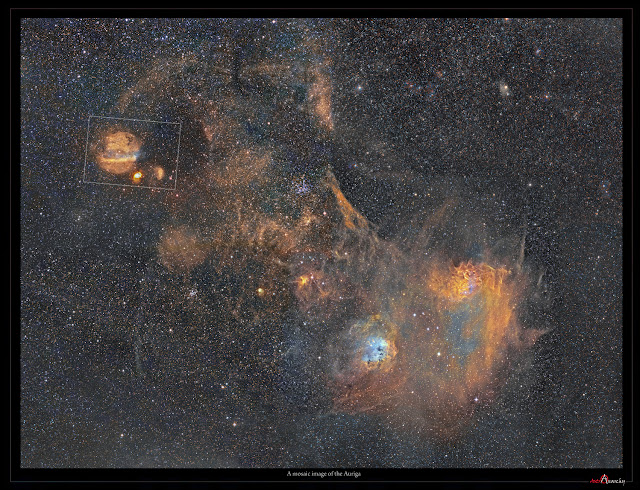COPYRIGHT, PLEASE NOTE
All the material on this website is copyrighted to J-P Metsavainio, if not otherwise stated. Any content on this website may not be reproduced without the author’s permission.
BUY A MUSEUM QUALITY POSTER
BUY A POSTER:https://astroanarchy.zenfolio.com/
Monday, March 23, 2015
Sharpless 232 (Sh2-232) and companions in Auriga
This was one of the most difficult targets I have shot lately, very diffused and dim. Now when the season is about to end, up here 65N, we have had clear skies one after another and I have collected exposures to unveil this target. Total exposure time is now about 24h hours. Image is a two frame mosaic.
There seems to be some interesting looking structures in this emission nebula. One of them can be seen at bottom right, just under the larger nebula. It looks like some kind of circular formation with several dim concentric layers. An other one is a very small area emitting light from an ionized oxygen (O-III) at center of the Sh2-232 at right.
Sharpless objects 232, 231, 233 and 235
Image is a two frame mosaic, click for a large image
Image is in mapped colors from an emission of the ionized elements. Golden areas are from emission of sulfur and hydrogen. There is a very little an ionized oxygen, O-III, in there.
An experimental starless version
This starless image shows better the details of the actual nebula complex. (The blue dot is not a star)
A single frame closeup of Sharpless 232
Note the blue dot at middle of the photo, it's not a star but a small area of nebula emitting the O-III light.
A closeup of the blue dot at the middle
There is a small area of an ionized Oxygen (O-III) it can be seen as a blue dot at the center.
An animation
This animated GIF shows all three emission channels imaged for this photo, O-III, S-II and H-alpha.
The small nebula is visible in both, H-a and O-III, S-II doesn't show it. It could be nice to understand the mechanism behind this small object. Is it part of the large nebula and what is the energy source for the ionization? Has anyone else noticed this object? Let me know, if you have some info about it.
EDIT
INFO
Sharpless 232 (Sh2-232) large and very faint member of coplex of diffused nebulae in Auriga. One frame photo covers about a square degrees of sky. Panorama spans about 1,5 degrees horizontally. There are generally very little information about this group of nebulae.
Photo in visual colors
Click for a large image
Natural color composition from the emission of ionized elements, R=80%Hydrogen+20%Sulfur, G=100%Oxygen and B=85%Oxygen+15%Hydrogen to compensate otherwise missing H-beta emission. This composition is very close to a visual spectrum and it has a very red appearance due to domination of hydrogen emission, H-alpha.
The Sh2-232 in visual colors
Orientation in wide field mosaic of the Auriga
The are of interest is marked as a white rectangle. More info about this wide field photo can be found HERE
Technical details
Processing work flow
Image acquisition, MaxiDL v5.07.
Stacked and calibrated in CCDStack2.
Deconvolution with a CCDStack2 Positive Constraint, 33 iterations, added at 50% weight
Color combine in PS CS3
Levels and curves in PS CS3.
Imaging optics
Celestron Edge HD 1100 @ f7 with 0,7 focal reducer for Edge HD 1100 telescope
Cameras and filters
Imaging camera Apogee Alta U16 and Apogee seven slot filter wheel
Guider camera, Lodestar x2
Astrodon filter, 5nm H-alpha
Astrodon filter, 3nm O-III
Astrodon filter, 3nm S-II
Exposure times
H-alpha, 60 x 1200s = 20h
O-III, 6 x 1200s = 2h min.
S-II, 6x1200s = 2h min.
Total 24h
A single un cropped, calibrated and stretched 20 min. H-alpha frame as it comes from the camera
Another interesting feature of Sh2-232
A ring like formation
I have animated to this starless version of Sh2-232 photo, what I'm seeing in lower part of the nebula. There is a ring like formation and I'm seeing some hints of the concentric structure too.
Labels:
Narrowband color images,
nebula
Subscribe to:
Post Comments (Atom)




















No comments:
Post a Comment